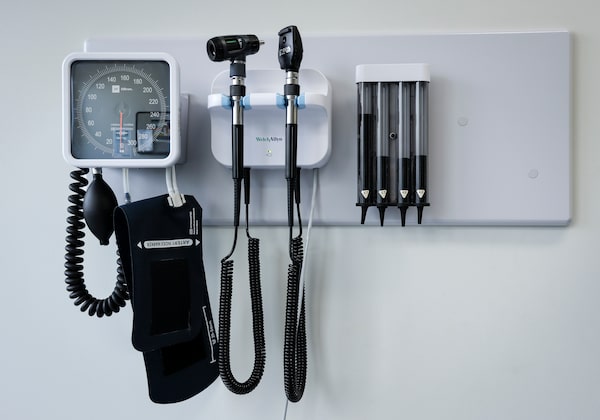
Medical tools are pictured in an exam room at a health clinic in Calgary, July 14, 2023. The Canadian Medical Association estimates that doctors collectively spend more than a million hours a year dealing with sick notes.Jeff McIntosh/The Canadian Press
Employers should not require employees to get doctors’ notes when they call in sick, and provinces should ban such mandates, the Canadian Medical Association says.
In a new position paper set to be released Monday, the CMA, which represents doctors across the country, said sick notes were unnecessary busy work that were taxing already strained family practices.
“The responsibility for overseeing employee or student absenteeism lies with the employer or educational establishment, not with the physician or the health care system,” the paper says.
More than five million Canadians struggle to access primary care, according to recent estimates, and one of family doctors’ top complaints has been the amount of paperwork they are asked to do.
The CMA estimates that doctors collectively spend more than a million hours a year dealing with sick notes. That is based on a national extrapolation of a survey conducted by a Manitoba doctors’ group, in which physicians said they averaged five or six sick notes a week.
An Abacus Data survey of 1,500 Canadians, conducted between Oct. 7 and 10, found that a third had to give a sick note to their employer in the past year. Three-quarters of all respondents said they would support legal restrictions on sick notes. (The online survey does not have a margin of error.)
Kathleen Ross, a family physician in B.C. and past president of the CMA, said sick notes are an inefficient and ineffective use of doctors’ time. For example, she said, doctors are often called to provide sick notes days after the illness has already peaked, but they may feel pressure from patients to provide the note anyway – knowing that the employees’ paycheque is on the line.
“I have absolutely no way of accurately verifying that you were sick,” she said.
In its position paper, the CMA recommends that provinces legislate limits on employers and schools asking for sick notes for short-term illnesses. The association suggests employers could instead ask employees to sign attestations about their illness, or provide flexible sick leave.
The CMA also asks government, employers, schools and “society in general to stop resorting to physicians as a default when seeking validation for something that does not require medical intervention or medical expertise.”
Some provinces have already enacted such measures. Nova Scotia passed a law last year that banned sick notes for absences of five or fewer working days, or two short absences in a year. When notes are required, they can come from other health care professionals, such as nurses. Quebec introduced a similar bill to this spring.
Ontario proposed changes earlier this year that would prohibit employers for requiring sick notes for the three unpaid annual sick days they are required to provide. The Canadian Life and Health Insurance Association, which represent insurers, expressed approval and said “doctors should be focused on patients not filling out forms.”
Ultimately, Dr. Ross said, workplace illnesses are often a human-resources problem, but sick notes are “downloading what should be an HR issue onto physicians.”